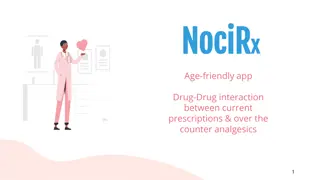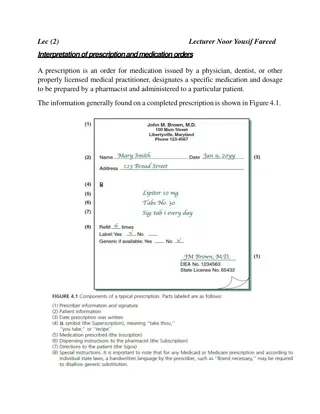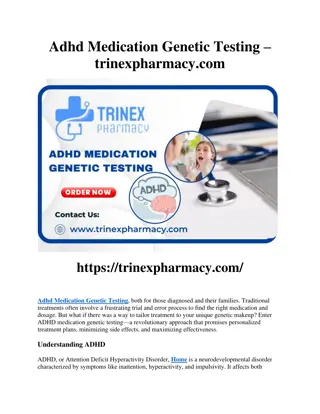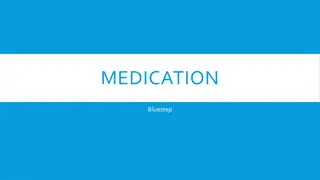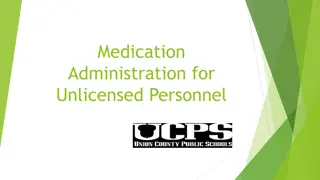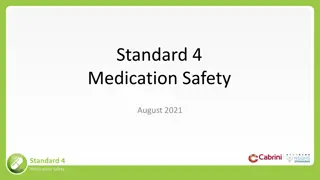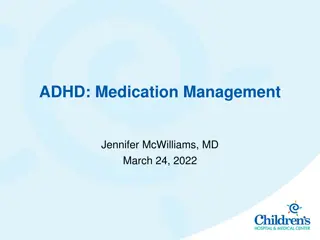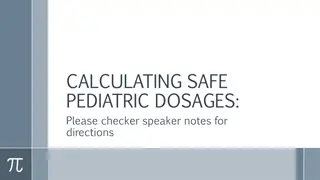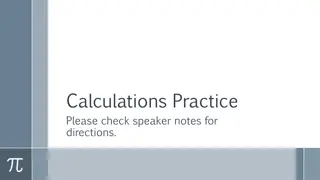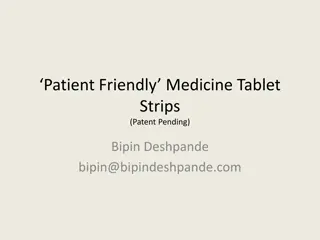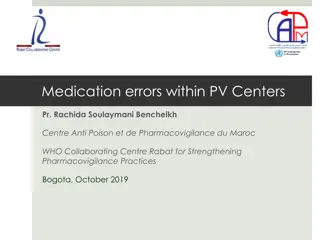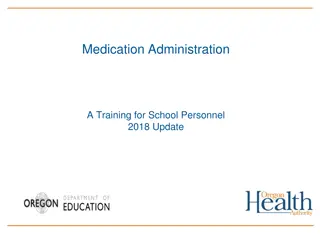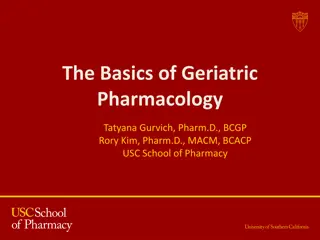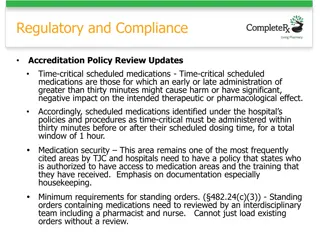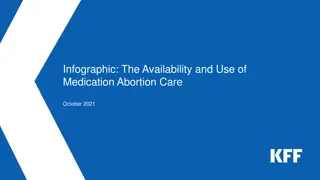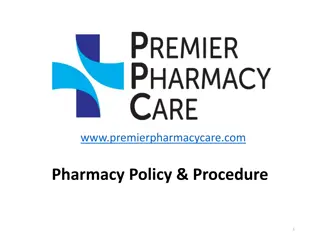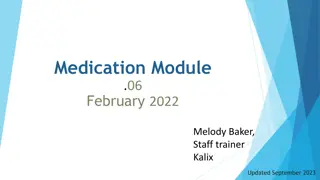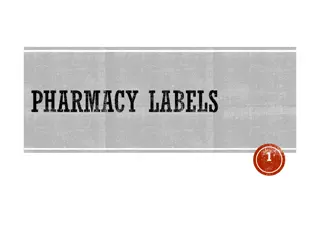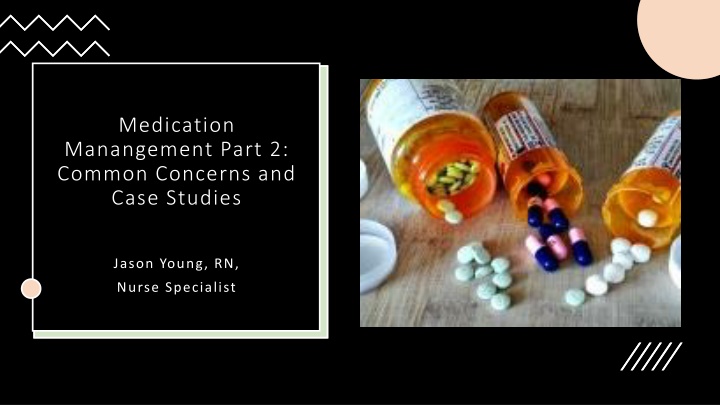
Medication Management: Common Concerns and Case Studies
Explore common medication concerns and case studies in this informative session by Nurse Specialist Jason Young. Identify key issues, effects, and prevention strategies related to medication management. Learn from real-life scenarios and understand the importance of regular case conferences for optimal care.
Download Presentation

Please find below an Image/Link to download the presentation.
The content on the website is provided AS IS for your information and personal use only. It may not be sold, licensed, or shared on other websites without obtaining consent from the author. If you encounter any issues during the download, it is possible that the publisher has removed the file from their server.
You are allowed to download the files provided on this website for personal or commercial use, subject to the condition that they are used lawfully. All files are the property of their respective owners.
The content on the website is provided AS IS for your information and personal use only. It may not be sold, licensed, or shared on other websites without obtaining consent from the author.
E N D
Presentation Transcript
Medication Manangement Part 2: Common Concerns and Case Studies Jason Young, RN, Nurse Specialist
The participant will be able to: 1. Identify four common medication concerns found during Wellness Assessments 2. List three effects of medication concerns 3. Articulate three ways to prevent medication concerns and problems Objectives
Common Medication Concern #1 Documentation of a monthly case conference with the HWD (or designee) and the prescribing health professional was not found in the SHRs.
Confirm the rationale for long-term prescribed medications at least monthly with case conferences between the HWD (or designee) and the CP/NP/PA Document in the SHR PRH PRH- -2:2.3, R14: 2:2.3, R14: Appendix #2 Appendix #2 (Non (Non- -Controlled) Controlled) & #4 (Controlled) & #4 (Controlled) Include student adherence to the medication prescribed Include any side effects the student reports Document. Is the medication producing the desired effect?
Mark has been on center for 4 months and has DM2, bipolar Disorder, and ADHD. He is on several medications and sees the center physician and CMHC (who are not on center the same day and rarely see each other). Mark came back from seeing his treating psychiatrist with a change in medications 2 months ago. Medication changes were documented on the MAR but no one has documented the required monthly case conference. Mark has had problems adjusting to his change in medications and informed the CMHC. Case Example Medication Concern #1 What are the benefits of the monthly case conference?
Common Common Medication Medication Concern #2 Concern #2 The residential living staff is not documenting medication doses observed after-hours on a Medication Observation Record (MOR) or Controlled Substance Medication Record (CMOR)
PRH PRH- -2: 2.3,R14. 2: 2.3,R14. Medication Medication Management and Management and Appendix 203, Appendix 203, Medication Medication Management Management Guidelines # 7b (non Guidelines # 7b (non- - controlled) and #13b controlled) and #13b (controlled) (controlled) Any medication dose observed after hours must be documented on a Medication Observation Record (MOR), and a HWC staff member should file the MOR in the SHR at least weekly.
Shonda takes Norco 325/5 mg as needed for sickle cell disease. She comes to see you and says her medication is gone from her lockbox. Case Example Case Example Medication Medication Concern #2 Concern #2 You do a count of her medications in wellness and the count is accurate. You see there are no CMORs in the SHR and, upon further investigation, there are no completed CMORs in residential. Finally, you see in the Narcotic Logbook that the doses placed in the student's medication lockbox are documented. Why is it important to get the CMORs weekly?
Common Medication Common Medication Concern #3 Concern #3 Medication Administration Records (MARs) are not filed in the SHRs monthly
PRH PRH- -2: 2.3,R14. Medication Management and Appendix 203, Medication 2: 2.3,R14. Medication Management and Appendix 203, Medication Management Guidelines # 3 (non Management Guidelines # 3 (non- -controlled) and # 9 (controlled) controlled) and # 9 (controlled) DOCUMENT PRESCRIPTION ORDERS AND THE ADMINISTRATION OF DOSES IN THE SHR. MONTHLY MEDICATION ADMINISTRATION RECORDS (MARS) MUST BE FILED IN THE SHR PRESCRIPTION ORDERS SHOULD BE TRANSCRIBED TO A MAR EXACTLY AS THE ORDER READS.
Meredith, age 17, goes home for a weekend pass. The center has a new HWD and agency nurses filling in temporarily for the past 6 months. Case Example Case Example Medication Medication Concern #3 Concern #3 Meredith's mother called and said Meredith was hospitalized for Bipolar Disorder. She said her lithium levels were extremely low. She asked if Meredith had been provided her medications as prescribed and if she had been taking them. The new HWD checks both the MARs and MORs which have not been filled out consistently over the past 8 weeks. How should the medications have been documented? Can you prove Meredith's medications were provided?
Common Common Medication Concern Medication Concern #4 #4 Students on prescribed medications do not have MARs filed in the SHRs. Prescription orders are not always transcribed to the MARs as ordered.
PRH PRH- -2: 2.3,R14. Medication Management and Appendix 2: 2.3,R14. Medication Management and Appendix 203, Medication Management Guidelines #3 (Non 203, Medication Management Guidelines #3 (Non- - controlled) and #9 (controlled) controlled) and #9 (controlled) Monthly Medication Administration Records (MARS) must be filed in the SHR Prescription orders should be transcribed to a MAR exactly as the order reads.
During a PCA, the Assessor reviewed 10 SHRs. In 4 of the 10, students on psychotropic medication the SHR did not have MARs. The Assessor also found in 3 of the 10 records new medications ordered and notated by the center nurse but not transcribed to the MAR. Case Example Medication Concern #4
Over-the-counter (OTC) medication used outside of the HWC is not consistently documented in the SHRs. The over-the-counter (OTC) medication sign-out sheets are not returned to the HWC weekly. Common Common Medication Medication Concerns Concerns #5 and #6 #5 and #6
Document OTC medications use outside of the HWC on a sign-out sheet kept with the OTC medication box The sign-out sheet should include student s name, medication taken, signature of the student, and signature of the observing staff member Each OTC lockbox and sign-out sheet must be returned to the HWC at least weekly to restock and document. PRH PRH- -2: 2.3, 2: 2.3, R14(b); R14(b); Appendix Appendix 203 203 (OTC (OTC Medications Medications #5 and #5 and 6) 6)
Julie, age 19, has been on center for 6 months. She has been getting Tylenol 500 mg from the ILAs every night. She also gets doses of Tylenol from her instructors. Julie takes an overdose and ends up in the hospital. When the HWM looks at Julie's SHR, he notices there are no OTC sign out sheets filed or documented in it. The HWM gets the OTC sign out sheets for Julie from the dorm and classrooms and notes how many times Julie has received Tylenol. Case Example Medication Concern #5 and #6 How could this have been prevented?
Common Common Medication Medication Concern #7 Concern #7 The center physician writes an order, but during a review of the SHRs it is found the order is not signed off by the nurse.
Centers must follow medication management guidelines as specified in Appendix 203 Medication Management Guidelines PRH PRH- -2:2.3, 2:2.3, R14(b) R14(b)
Case Example #1 Medication Concern #7 Myla Johnson is a non-insulin dependent diabetic; she is compliant with her medication of Metformin 500 mg 1 by mouth daily and ADA diet plan. For the past several weeks, her blood sugar readings have been over 250. The center physician increased her dosage of Metformin to 500 BID and added 2.5 milligrams (mg) of glipizide. She is scheduled to see the center physician for a follow-up in 2 weeks. Myla s orders were not signed off by the center nurse. Myla did not start her new medication nor the increase in Metformin dosage.
Marlon, age 23, has HTN and is on Lisinopril. He sees the center physician with complaints of headache, dry cough, and upset stomach. The center physician changed Marlon s medications to Bumex 0.5mg daily and adds Famotidine 20 mg daily. The center physician documents the changes on the SF 600 and tells Marlon he wants to see him again in 1 month. Case Example 2 For Medication Concern #7 Marlon comes in the next week with the same complaints. The HWD looks in the SHR and sees the physician note but notices it has not been signed off by the new nurse. The HWM then looks at all the SHRs of the students seen the previous week and none of the physician's orders are signed off and none of the MARs have been updated. What should have been done to prevent this? Where should the medications be documented?
Medication Concern #8 Centers not following PRH Appendix 203, Center's Medication SOPs or state and federal laws regarding medication regulations. Students do not keep their assigned lockbox keys on their person. They are stored by residential or in a locked cabinet. Medication lockboxes are not secure, and staff have access to them After-hours-controlled substances are not stored in the National Office-issued lockboxes but are stored in a separate medication cart. The main medication lockboxes do not appear secure as they are free-standing and mounted on a mobile platform.
PRH PRH- -2: 2.3, R14(a, b) 2: 2.3, R14(a, b) and Medications SOPs and Medications SOPs Centers must comply with all state and federal regulations regarding prescribed non-controlled medications, prescribed controlled substances, and over-the-counter medications. Centers must follow medication management guidelines as specified in Appendix 203 Medication Management Guidelines.
Case Example Medication Concern #8 El Pike Job Corps Center is a small center and the medication lockboxes are in the Recreation area. There are no cameras or additional security in the area. Keys are kept in cabinet in the Dorm supervisor's office. Students who take controlled substances go to the Dorm supervisor's office to get their medications. List the problems with this example.
Common Medication Common Medication Concerns #9 & #10 Concerns #9 & #10 There are no approved SOPs for medication management There are no approved SOPs for prescribed non- controlled medications and controlled substances that include the medication lock boxes The centers Prescribed Non-Controlled Medications SOP & Prescribed Controlled Substances SOPs have not been reviewed and updated annually. The center s observed procedures are not in compliance with their approved SOPs and Appendix 203
PRH PRH- -2: 2.3, R14; 2: 2.3, R14; Exhibit 5 Exhibit 5- -1 1 Medication Management (see Appendix 203, Medication Management Guidelines) Exhibit 5-1 Standard Operating Procedures
PRH PRH- -2:2.3, R14(b) and Exhibit 2:2.3, R14(b) and Exhibit 5 5- -1 Standard Operating 1 Standard Operating Procedures Procedures Centers must follow medication management guidelines as specified in Appendix 203 Medication Management Guidelines
Case Example 1 Medication Concern #9 & #10 Case Example 1 Medication Concern #9 & #10 A student files a congressional complaint. The complaint is the student was not provided their medications as prescribed. The center must produce a copy of their current medication SOPs and all the medication records for this student
Kara, age 16, is admitted to the hospital while on weekend pass. The family requests to pick up the student's belongings and her leftover medication. The HWD notates in the SHR that the medication was picked up by the family. The family files a complaint that not all of Kara's medication was returned and the counts were not accurate with the filled dates on the bottles. The HWD is asked to provide all progress notes, monthly case conference documentation, and MARs/MORs for this student. The MARs and MORs had inconsistent or missing days of medications. No monthly case conference documentation was documented. Kara told her parents she never received a key to her medication lock box and the RAs kept the keys. Case Example 2 Medication Concern #9 & #10
Not reporting medications errors and not having on their medication SOPs Disposal of medications Sending medications to separated students Not logging in medications upon student s arrival on center Other Medication Concerns and Potential Problems
Handling Medication Errors Handling Medication Errors Student A comes to wellness to pick up his medications for the weekend. You ask his name but do not check his ID. He gives you a nickname. Student B comes to wellness to get his medication for the night. When you give him his medications, he says These are not my medications. You realize you gave Student B's medications to Student A. What do you need to do?
Disposal of medications During a PCA, the Assessor discovers outdated medications in a drawer in the medication room. This included OTC and student-specific prescribed medications.
Sending Sending Monique was sent home with a week's supply of medications when she was placed on leave pending a disciplinary board review. Monique was then separated from the program. She called the center numerous times requesting the remainder of her medications be sent to her. Medications Medications to to Separated Separated Students Students A complaint was made to the Regional Office. Upon investigation by the Regional Director, it was found the left-over medications were returned to the pharmacy for disposal. What could have been done to prevent this?
New student Mike arrived on center after Wellness was closed for the day. He had a paper bag with prescriptions, including Adderall. Security collected the bag and placed it in a locked box in Safety & Security. No one noted the content of the bag. Not Logging Medications upon Student Arrival to Center Mike went to Wellness the next morning to take his Adderall. The Adderall was missing. Mike made a complaint to the National Office and an investigation was completed by Regional Office and police.
Resources & References PRH Chapter 2.3, R14 Appendix 203 Centers Medication SOPs Instruction Notice 17-02 Notification and Instructions Regarding use of Medication Lockboxes Nurse Practice Act Pharmacy Practice Acts

